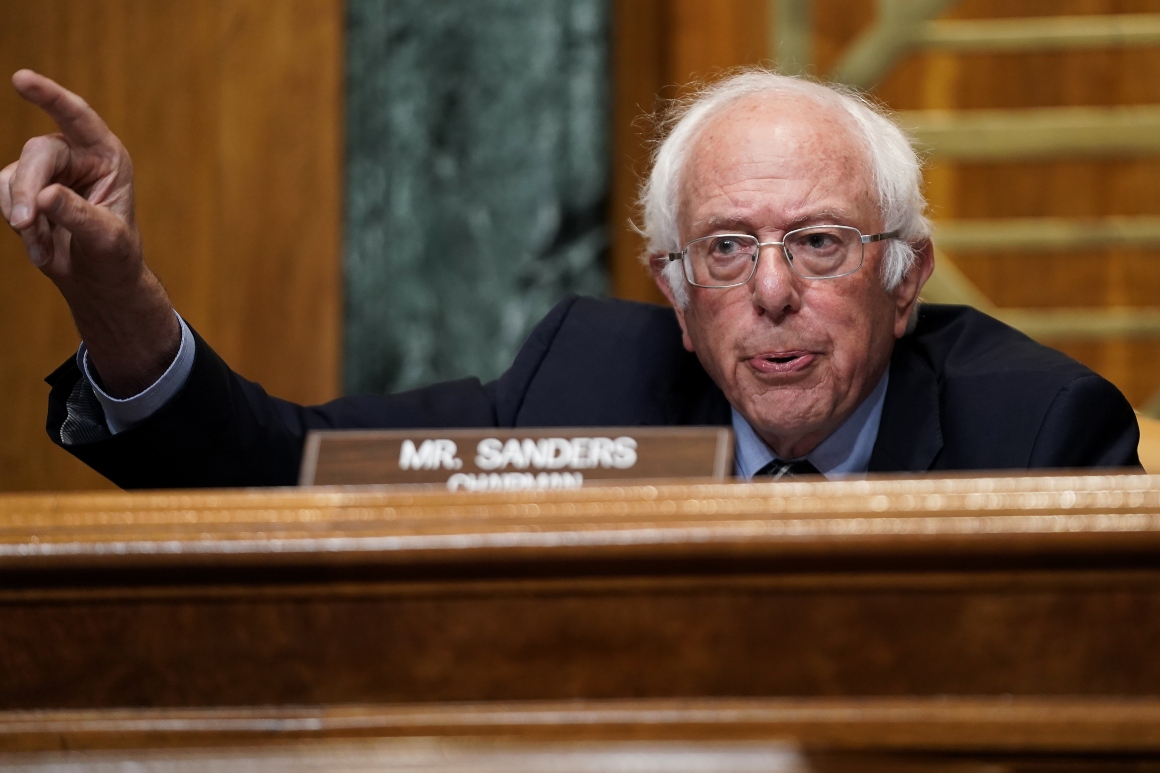The White House has been hesitant to abandon talks with centrist Democrats and Republicans, leading a growing number of progressive lawmakers in both chambers to decry the slow pace of negotiations. This past week a handful of Democratic senators shot off warning tweets at the White House, threatening to withhold support for infrastructure bills without climate change provisions included in the one expected to pass with only Democrats. But Sanders didn’t join the chorus.
“He’s focused on building momentum for a reconciliation bill that will be the most consequential legislation for working people enacted since the 1930s,” said a Sanders aide.
Sanders isn’t as concerned as other progressives are about their priorities being left out of the overall infrastructure package because the budget process is only just beginning, the aide added. And Sanders believes strong climate provisions — one of his biggest priorities — will be in a reconciliation bill.
At the same time, Sanders, chair of the Senate Budget Committee, has communicated to the White House that he thinks the bipartisan talks should wrap up, a source familiar with his interactions with the White House said.
The White House is in regular touch with both Senate Majority Leader Chuck Schumer and Sanders about infrastructure priorities, according to a White House official, who described its relationship with Sanders as strong. A Sanders aide also confirmed that the senator is in close touch with the White House and Schumer.
What the final reconciliation package looks like and which committees are responsible for various parts of it remains to be decided. When bipartisan talks end — with or without a deal in hand — different factions of Democratic lawmakers will start to haggle among themselves over the legislative language of the reconciliation package.
Some Democrats are optimistic their priorities won’t be left behind because of Biden’s repeated comments that “inaction” on his entire package — which includes money for eldercare, childcare and K-12 and higher education — is unacceptable. Some progressives are sanguine, too, that the bipartisan talks will fail because they’ve repeatedly stalled over disagreements on how much total to spend and how to pay for the narrower bill.
As those talks have continued, high-profile Democrats — from former vice president Al Gore to John Podesta — have pressed Biden to keep climate provisions in any final package that passes. The White House has said it planned to do so. On three recent occasions, it cited a shortfall on climate issues as a reason it rejected GOP compromise offers. That included when press secretary Jen Psaki noted why Biden broke off talks with Sen. Shelley Moore Capito (R-W.Va.)
“He informed Sen. Capito today that the latest offer from her group did not, in his view, meet the essential needs of our country to restore our roads and bridges, prepare us for our clean energy future, and create jobs,” Psaki said on June 8.
Liberals were steamed when Biden nonetheless returned to bipartisan talks with yet another group of senators. But this time, instead of only Republicans, Sens. Joe Manchin (D-W.Va.) and Kyrsten Sinema (D-Ariz.) were part of the negotiations — a clear signal the two were not yet persuaded to support an infrastructure bill or a reconciliation package that would include it. While progressives have pushed for Biden to break off talks and force a vote, White House allies argue that’s short-sighted.
“Exhausting the bipartisan process around infrastructure — whether it gets to a deal Biden can accept or not — could actually help Manchin, Sinema and others get to ‘yes’ on whatever eventually emerges,” said Ben LaBolt, a former Obama aide and Democratic strategist close to the White House. “Joe Biden was Barack Obama’s vice president and he will know not to wait for Godot if Republicans don’t engage in a good faith process. But to get to a good legislative outcome, it always made strategic sense to engage both parties in the Senate.”
The White House has held steadfast to its strategy, which is to continue attempting at a deal with Republicans but, at the same time, move forward with the bureaucratic necessities in the Senate should no deal materialize.
“The president is fighting to deliver historic infrastructure investments that will generate economic growth, create middle class jobs, ensure our leadership in clean energy, and advance our competitiveness in the world,” White House spokesperson Andrew Bates said. “He and his team are engaged in good faith bipartisan negotiations towards that goal, and at the same time see multiple paths forward.”
But unease is growing among more and more Democratic senators the longer the infrastructure negotiations with Republicans continue.
Sen. Ron Wyden (D-Ore.) was one of multiple Democrats who warned about the exclusion of climate policies last week. A clean energy package that passed out of the Senate Finance Committee in May consolidated clean energy tax breaks and made them contingent upon emissions reduction. It is expected to be a central piece of the final package.
Wyden would need “ironclad assurances that reconciliation would move forward with robust climate, clean energy legislation to support moving anything on a separate track in a bipartisan way,” said a Senate Democratic aide.
The Biden administration says a dual-track approach is exactly what it’s pursuing, but progressive anxiety is reaching a boiling point. The longer it takes to pass infrastructure, progressives argue, the less time Biden will have to focus on other big agenda items. And voters are waiting for more aid to deal with the economic stressors brought on by the pandemic, they say.
“There’s no question they’re working hard and I don’t question their good intentions,” Rahna Epting, executive director of MoveON said of the White House. “Our concern is the dynamics in Congress are really slowing the progress.”
“We’re very worried and we need to turn up the heat,” Epting added. “Business as usual is not what people voted for.”













































